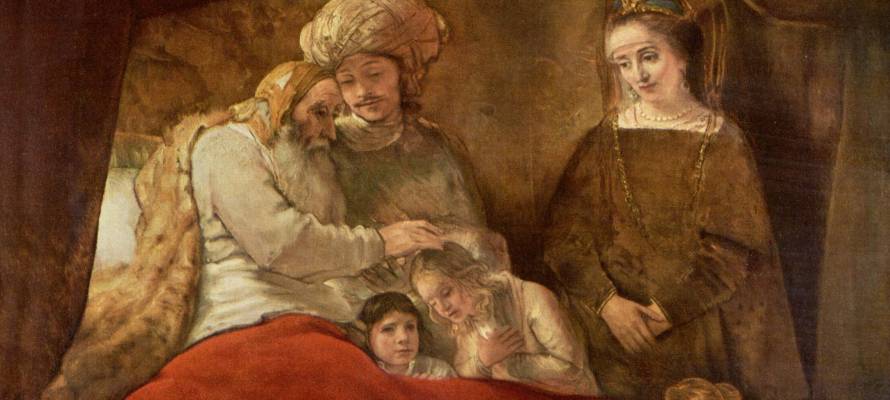Why do we specifically bless our children to be like Ephraim and Menashe? Why not bless them that they should be like Abraham, Isaac and Jacob? David? Moses?
By Rabbi Ari Enkin, Rabbinic Director, United with Israel
This week’s Torah portion is “Vayigash” (Genesis 44:18–47:27), and in it we read about Jacob’s descent to Egypt to reunite with his long-lost son Joseph, who he thought was dead.
Not only was Joseph not dead, but he was the second in command of Egypt. It wasn’t just Jacob who went down to Egypt to see Joseph, but he took his entire family along with him. In other words, the entire Jewish nation went down to Egypt!
As such, although many people assume that the first exile was the Babylonian destruction of Jerusalem and subsequent exile, it is really in this week’s Torah reading where we find the Jewish people first going into exile.
Jacob and his family lived in Goshen for 17 years. When Jacob felt that his end was approaching, he sent for Joseph and had him swear not to bury him in Egypt, but to take him back to Canaan and lay him to rest with his fathers, in the Cave of Machpelah. This is something that is widely practiced today: burial in the land of Israel. It is considered extremely commendable to make arrangements to be buried in Israel. In fact, there is hardly an El Al flight from the USA that does not contain bodies in the baggage hold for burial in Israel.
One day, Joseph was told that his father was seriously ill. Joseph took his two sons, Menashe and Ephraim, and went to see Jacob. It is interesting to note that Jacob was the first to take ill before dying. Before this time, people would die suddenly of old age. Jacob, however, prayed to God that death no longer come suddenly in order for a person to be able to prepare properly for his passing and put things in order.
Jacob blessed Menashe and Ephraim and raised them to equal status of his other sons. As such, there were now 14 tribes of Israel. Now here is something very interesting: Jacob blessed Menashe and Ephraim in the following way: “May the angel who redeemed me from all evil bless the children, and may they be called in my name and in the names of my fathers Abraham and Isaac, and may they multiply on earth. By you shall the Jewish people bless their sons saying, ‘May God make you like Ephraim and Menashe.’“
Let us focus on the latter phrase “By you shall the Jewish people bless their sons saying, ‘May God make you like Ephraim and Manasseh.” It is a widespread Jewish custom for parents to bless their children at the start of the Friday night Shabbat meal. Girls receive the blessing: “May God make you like Sarah, Rebecca, Rachel and Leah” and boys are blessed “to be like Ephraim and Menashe.”
Why do we specifically bless our children to be like Ephraim and Menashe? Why not bless them that they should be like Abraham, Isaac and Jacob? David? Moses? Who are Ephraim and Menashe in the scheme of things? Most people haven’t even heard of them.
It is explained that Ephraim and Menashe were the first set of brothers who did not fight. Cain and Abel…they fought big time. Abraham’s two sons – Isaac and Ishmael – didn’t get along, to say the least. Isaac’s twin sons, Jacob and Esau, were at each other’s throats for most of their lives. Joseph’s brothers threw him into a pit and sold him into slavery, not to mention that some brothers actually wanted to kill him. Brotherly love doesn’t exist in all of Genesis!
Ephraim and Menashe were the first break this pattern. They got along perfectly. Despite their differences, tastes, interests, and professions, they always got along. Indeed, there is no greater blessing than peace among siblings. As King David said: “How good and pleasant is it for brothers to sit peacefully together” (Psalms 133:1).
Another reason we bless our children to be like Ephraim and Menashe is given by Rabbi Shimshon Raphael Hirsch (19th century Germany). He explains that Abraham, Isaac and Jacob raised their children primarily in the Land of Israel. The Holy Land is the most hospitable Jewish environment. In many ways, being Jewish in Israel is easy. Assimilation is minimal. Jewish continuity is assured only in the land of Israel. But due to the famine, Jacob and his family moved to Egypt, and the rest is history. The next generation of Jews would grow up surrounded by ancient Egyptian immorality. It wasn’t clear that Judaism would survive in the Egyptian cesspool of temptation.
Notwithstanding the challenges, we made it. We survived as a nation and were eventually taken out of Egypt, given the Torah and taken to the Promised Land. It may just be that Ephraim and Menashe take the credit for this. They remained loyal to Judaism and Jewish values despite their environment. This is why we bless our children to be like Ephraim and Menasse. We pray that our children, too, remain committed and observant Jews despite the challenges and temptations of life in exile. As the saying goes: “The issue is not whether you have Jewish children, it’s whether you have Jewish grandchildren.”
For more insights by Rabbi Enkin on this week’s Torah portion, click on the links below:
Bring Joy to Israeli Soldiers - Send Winter Care Packages!
We are honored to thank the young men and women of the IDF who risk their lives every day to defend the citizens of Israel.
Join us in sending winter care packages and personal notes of support to Israeli soldiers who are out in the cold all day.
Warm up a soldier's heart with essential winter wear including fleece jackets, hats, gloves and more. Keep an entire unit warm!
THE SOLDIERS REALLY APPRECIATE YOUR LOVE AND CONCERN!
Click Here to Send Your Gift and Personal Note to Israeli Soldiers

